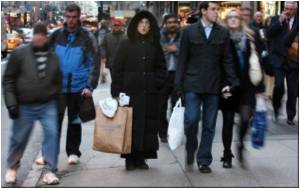People who spend too much or too little money are notably less happy than people who are satisfied with what they have spent, reports a new study.

"Some people experience this distress a lot, where they typically spend less than they would like to, they pass up on indulgences, they buy cheaper versions when they could have bought higher quality items, and they end up kicking themselves afterwards," said Scott Rick, a marketing professor at the Ross School of Business at the University of Michigan in Ann Arbor.
"On the other end of the spectrum," he said, people "chronically spend more than they should and end up kicking themselves, too."
By studying the relationship between emotions and shopping habits, Rick and colleagues are finding ways to help companies inspire the shopping-averse to loosen their wallets. The work may also help people boost their own happiness and even improve their marriages by adjusting their shopping behaviors.
To understand why we shop and how shopping makes us feel, researchers talk about three categories of people. The first group, called the unconflicted consumer, defines about half of us, said Cynthia Cryder, a consumer behavior researcher at the Olin School of Business at Washington University in St. Louis. Unconflicted consumers feel relatively content with how much they spend and what they buy.
A smaller percentage of people are spendthrifts who thrive on luxury purchases. At the other extreme are tightwads, who avoid spending altogether. When they do buy things, they always pick the cheapest options.
Advertisement
Those differences may be rooted in our brains. In a 2007 study that scanned the brains of people as they made purchases, Rick and colleagues found that the distress that tightwads experienced while spending money was accompanied by extra activity in a brain structure called the insula, which is associated with negative feelings.
Advertisement
Spendthrifts, on the other hand, are happy to shop. But after the bills are paid, Rick has found, they feel as much distress as tightwads do.
"If you just ask people to report their general life satisfaction, you get an inverted relationship," he added. "Tightwads and spendthrifts are equally unhappy."
Ironically, the two groups also seem to attract each other. Consistently, Rick and colleagues report in a study in press at the Journal of Marketing Research, tightwads end up marrying spendthrifts, even though people tend to seek out romantic partners with similar personalities.
In this case, both tightwads and spendthrifts tend to be unhappy with their own spending habits. As a result, they find love in their shopping opposite. But surveys show that money conflicts up the risk of marriage troubles in these mismatched pairs.
Source-ANI







